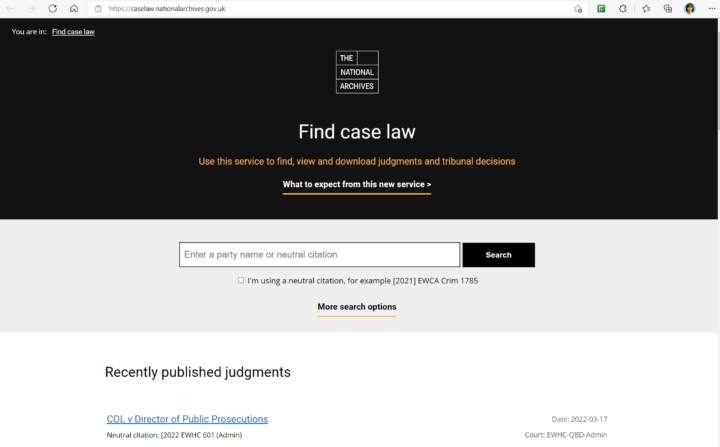The National Archives has today taken on responsibility for the external publication of court judgments, creating the first publicly available government database of judgments.
John Sheridan, Digital Director at The National Archives said:
‘We are taking on this role as keepers of the public record, working under the Public Records Act 1958. Court judgments are hugely important public documents. We are providing access for people today, with a modern digital service. We are also preserving the records for future generations. It is a step change in terms of access and use of judgments data.’
The new service, known as Find Case Law, will begin by publishing court and tribunal decisions from the superior courts of record – The Supreme Court, Court of Appeal, High Court, and Upper Tribunals. Going forward, The National Archives will continue to work with the Ministry of Justice and the Judiciary to include judgments from more courts and tribunals and to add historical judgments to the service. As this is a new service, we will continue to improve it over the next few months and years, please help us to improve the service by giving us feedback.

The initial collection of judgments and decisions will total 50 000 dating back to 2003 for court judgements and 2015 for Tribunal decisions. Users will be able to search by neutral citation, party name, Judge’s name, court / chamber and date.
New judgments and decisions that are ready for publication will be sent directly from the courts and tribunals – The National Archives will never change them. However, if over time we receive several versions, we will keep all the digital copies but only publish the latest version authorised by the Court or Tribunal.
We will check every judgment and decision before we publish them on the Find Case Law service. We will always revert back to the judge for clarification when required. We know that speed is important for many of our users so we are aiming to publish judgments and decisions quickly.
The documents are published using an international open standard, the Legal Document Mark-up Language. That makes them machine-readable, opening the way for further processing and computational analysis.
The National Archives has worked with colleagues at the Ministry of Justice and the Judiciary to develop two free licences allowing re-use of content from the service.
The Open Justice Licence allows members of the public to continue to use, quote, and publish judgments or extracts from judgments. There are some limits to protect the proper administration of justice, around computational analysis of judgments as data.
For data users, there is a separate free Licence, which you need to apply for. This allows users such as legal publishers, LawTech companies, or academic researchers to process judgments as data, to provide a website search services, compute statistics or computationally analyse the law.
More information can be found on the Find Case Law site.